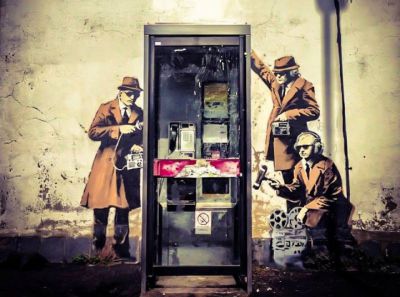
 Big Brother's New Surveillance Powers: They're Watching Us...
Big Brother's New Surveillance Powers: They're Watching Us...
Wednesday 24th September 2014 | Osh
Rights activists are hitting out against Parliament's plans to push through laws that seriously call into question our liberties and privacy rights. The laws will permit phone companies to access more of our private data than before, including records of who we've been calling on our phones and every website we've been visiting.
Despite the warnings that the bill would lead us down a dangerous road, the Prime Minister has defended it as a necessary tool in the fight against terrorism. The legislation, called the Data Retention and Investigation Powers Bill, allows the companies to keep records of users' private activity for at least a year.

Questions about state surveillance and personal privacy have been growing for a number of years now, particularly since the decrease in civil liberties since 9/11 and 7/7. The UK Home Office has been campaigning for new surveillance powers in order to access people's social media and email accounts, despite accusations that the government simply wants more ability to spy on it citizens.
The Home Office dismisses those claims, maintaining that the surveillance is needed to help prevent crime and terrorism. In defense of the mass surveillance push, the Home Secretary has cited data from the National Crime Agency that details how at least twenty serious criminal investigations in recent months had to be dropped due to missing communications data; the sort of data that could've been uncovered with enhanced surveillance of private email and social media accounts, as well as services like Skype and Facetime. Skype is already being investigated in Luxembourg for allegedly handing over users' private data to America's NSA.
The line between personal privacy and national security has been blurred more and more in recent years, with most people torn between deciding on which surveillance measures are genuinely in the public interest and which are an unnecessary infringement on our rights. In the current social and political climate, those concerns are likely to grow further in the years to come, with concerns not just about surveillance but also Internet freedom in general.
This increase in covert surveillance runs side by side with the mass growth of technology, which is allowing for new spying techniques to be developed all the time. A recent, example of this is the announcement by CIA Director David Petraeus that ordinary household appliances like ovens and fridges may be the surveillance devices of the near future. That's just great, right? We can't use our mobiles, email or Facebook without being spied on... and soon we won't be able to open the fucking fridge! What's so interesting about our fridge content anyway?

Reporters Without Borders, which publishes an annual list of nations that threaten freedom of information through censorship and surveillance, has branded both the UK and the US as 'Enemies of the Internet'. This inclusion of both countries on the list has been partly a result of the information leaked by famous Whistleblower Edward Snowden concerning the activities of American and British intelligence communities.
The fact that nations like the UK and US, both considered the classic, shining examples of liberty and democracy, are now sharing space on a list with authoritarian governments such as North Korea and Saudi Arabia is a worrying sign of the times.
Reporters Without Borders is calling for the EU and the UN to make laws to guarantee that digital freedoms and unrestricted access to the Internet are part of the EU Charter of Fundamental Rights.
